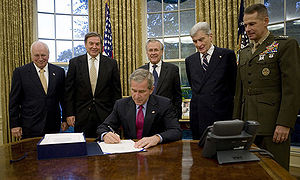The John Warner Defense Authorization Act of 2007 passed easily at the end of September 2006, authorizing the expenditure of $526 billion for fiscal year 2007. Only 23 U.S. representatives voted against the Act, and not a single senator objected during a unanimous voice vote.
One provision of the Act, Section 1076, has created outrage among grassroots activists, based on an article that swept through email and independent media rounds: “Bush Moves Towards Martial Law.” BORDC has compiled some resources to clarify what Section 1076 actually says, and how the Insurrection Act was changed.
A second provision in the law, Section 1061, would have required Presidential accountability on White House legal opinions about waterboarding and other torture techniques. This provision was modified during House/Senate conference committee sessions. Section 1061’s reporting requirements may have been further eroded by an October 17 Presidential signing statement.
More information about Legislative Threats to Our Liberties
HR 5122 Roll Call Votes:
In the House on 9/29, the Conference Report was agreed to by a vote of 398-23.
There was no roll call in the Senate. The Conference Report was agreed to by Unanimous Consent on 9/30.
Section 1061
Major features:
- Before it went into conference committee, Section 1061 specified a number of reports required from the President. Specifically, it would have forced the President to submit a report detailing the government’s legal briefs on whether waterboarding, sleep deprivation, stress positions, beatings, use of dogs, forced nakedness and use of extreme temperatures constitute cruel, inhuman or degrading treatment or punishment. This level of accountability sorely needed, but these reporting requirements did not make it into the final bill.
- Instead, the final bill contains these requirements: 1) that the President shall give notice to Congress of each investigation or prosecution on account of any violation of international obligations or laws regarding treatment of detainees and 2) that the Secretary of Defense shall report regularly to Congress on each investigation or prosecution.
- But reporting requirements typically run aground when President Bush issues his signing statements. On October 17, the President singled out Section 1061 as one of eleven provisions in the bill, which “the executive branch will construe…in a manner consistent with the President’s constitutional authority to withhold information the disclosure of which could impair foreign relations, the national security, the deliberative processes of the Executive, or the performance of the Executive’s constitutional duties.”
Section 1076
Major changes:
- Changed the title of the law from “Insurrection Act” to “Enforcement of the Laws to Restore Public Order Act”
- Specifies situations in which the President can invoke martial law (natural disaster, epidemic, or other serious public health emergency, terrorist attack or incident or other condition in which the President determines that domestic violence has occurred to the extent that state officials cannot maintain public order). These had not been specified before.
- Spells out the President’s obligation to inform Congress within 14 days when he determines to exercise the authority, and every 14 days thereafter, during the exercise of the authority. This had also not been specified under the Insurrection Act.
Compare the previous Insurrection Act to the current “Enforcement of the Laws to Restore Public Order Act” for yourself. Use the following links:
- HR 5122 Section 1076 is the Defense Appropriations Bill in which changes to the Insurrection Act appear. Choose the ENR (enrolled) version of the bill.
- Insurrection Act—See sections 331-335.
Congressional Remarks:
Senator Edward Kennedy (D-MA) spoke in favor of the changes to the Insurrection Act, referencing the Administration’s poor response to Hurricane Katrina. Kennedy seems to believe the provision does not grant any additional powers to Bush, but merely specifies which emergency situations will be covered by his existing powers:
- “As I understand the amendment, it defines when the President can call on the Armed Forces if there is a major public emergency at home. The amended statute now lists specific situations in which the troops can be used to restore public order. This includes natural disasters, epidemics or other serious public health emergencies, and terrorist attacks or incidents that result in domestic violence to such an extent that State authorities are unable to maintain public order. These were not mentioned specifically before. While the amendment does not grant the President any new powers, it fills an important gap in clarifying the President’s authority to respond to these new kinds of emergencies.”
Senator Patrick Leahy (D-VT) spoke out vehemently against the provision, as part of an overall defense of the National Guard as a body, which is best employed locally, by the Governor of the state in which the Guard is stationed, and not siphoned off as an auxiliary national force by the White House and Pentagon. Below are two quotes from his statements on September 29, 2006 in the Senate. Read his complete statement.
- “It also should concern us all that the conference agreement includes language that subvert solid, longstanding posse comitatus statutes that limit the military’s involvement in law enforcement, thereby making it easier for the President to declare martial law. There is good reason for the constructive friction in existing law when it comes to martial law declarations…”
- “Also, it seems the changes to the Insurrection Act have survived the conference because the Pentagon and the White House want it. It is easy to see the attempts of the President and his advisors to avoid the debacle involving the National Guard after Hurricane Katrina, when Governor Blanco of Louisiana would not give control of the National Guard over to President and the Federal chain of command. Governor Blanco rightfully insisted that she be closely consulted and remain largely in control of the military forces operating in the State during that emergency. This infuriated the White House, and now they are looking for some automatic triggers–natural disasters, terrorist attacks, or a disease epidemic–to avoid having to consult with the Governors.
http://www.bordc.org/threats/hr5122.php

 BORDC
BORDC
Tyranny Abounds